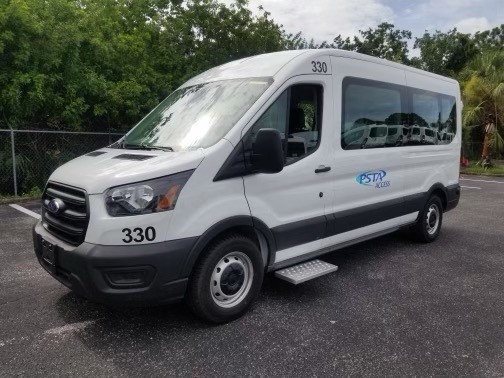A report written last September by David Rishel, a consultant to PSTA, lists a litany of problems associated with PSTA’s new software for its paratransit operation. A metric that the Guardian has developed indicates problems implementing cost-effective paratransit, and shows that the situation isn’t getting better.
The paratransit software is provided by Canadian company Spare Labs and it was procured in a procurement bungled by PSTA that we reported on over the weekend.
The four main problem areas Rishel identified in the report are inefficient routing, inability to schedule driver breaks during their 8-hour shifts, inability to manually manage and adjust the service as situations arise, and concerns that full audit trails for each trip are not being generated (to ensure compliance with ADA requirements.)
There is also concern that due to its design, Spare Labs software will never work as promised or desired by PSTA, in part because “the design, and clear intention, of the Spare service delivery management approach” is to make “manual dispatch intervention unnecessary. Spare’s commitment to this approach is absolute.“

However, this “absolute commitment” to having its algorithms set routes and make “manual dispatch intervention unnecessary” is at odds with e.g. §4.5.5 of the RFP, which states that:
4.5.5 The System shall permit PSTA to manually reassign any trip initially assigned by the algorithm.
The consultant found that the schedules produced by Spare Labs are less efficient that those produced by the previous vendor (Tran Ware), resulting in extra costs to the taxpayers of likely costing PSTA “something in the range of $1,000-$1,500 per day.” This could be a sign that the “Spare Engine” (as Spare Labs calls it) that is at the very heart of the route setting simply has a worse “engine” than its competitors.
One question we asked Spare Labs was this: “without giving away trade secrets, please provide a general technical description of how Spare Engine works and what mathematical approach or modeling approach it uses.” Spare Labs did not answer.

(picture is from the First Transit website)
According to Rishel’s report, when PSTA and First Transit have attempted to change the user-defined settings and force the Spare scheduling engine to schedule service using fewer routes [for increased vehicle utilization efficiency], On-Time Performance (OTP) dropped from the 90% range into the 70-80% range. Such levels are not in compliance with ADA regulations.
Presently, PSTA has opted to favor a higher level of OTP, at a higher cost, to avoid ADA compliance liability.
PSTA is hosting weekly 90-minute meeting to address the issues, but Rishel was critical of how they are managed. The meetings feature “no formal agenda, a free-flowing discussion, and a lack of defined next steps, outcomes or deadlines. Although these meetings are collegial and they are open to input from all, they do not seem to be leading to a rapid or predictable resolution of the many open items by Spare.“
The Spare Labs Software was supposed to go into service on July 1st, 2021, but PSTA had to continue with previous vendor Tran Ware until early December, 2021. During the last two full months on the Tran Ware platform, the ratio of MOD (Mobility on Demand) paratransit trips in the form of Uber or Lyft to dedicated transit vehicle trips was 0.87. For this past December and January, using the Spare Labs platform, that ratio was 1.34 in each month. That’s a 46% increase. Also, the ratio has risen in the last four months.
The “MOD/dedicated ratio” provides an indication of how well the scheduling software works in assigning trips to the dedicated transit vehicle fleet that PSTA already has contracted with First Transit, as opposed to having to have those riders use Uber or Lyft, which costs the taxpayers for more. The Spare Labs CEO Kristoffer Vik Hansen seems to disagree.
“The PSTA Access service requires pre-booking at least 24 hours in advance,” Vik Hansen said. “The PSTA MOD (mobility on demand) service requires no pre-booking and is available on-demand. Therefore, the PSTA MOD service would naturally see induced demand from the very nature of the service delivery model. The rise of the MOD trips would therefore be related to the fact that this is a great service for PSTA riders compared to the traditional options available to them (mainly PSTA Access).”
However, as a result of this “induced demand,” many of First Transit’s dedicated and more cost-effective paratransit vehicles are being idled. First Transit’ contract with PSTA is for 10 years which exceeds $100 million. Also, the dedicated fleet is ADA compliant, whereas MOD (Uber/Lyft) rides are not.

(image from his LinkedIn profile)
“Personally, I believe it is really great to see that paratransit riders in PSTA’s service area can get more on-demand services available to them, as this has not historically been the case,” Vik Hansen continued. “It is an amazing way to see more equity between fixed route riders (who always have been able to travel on-demand using fixed route) and paratransit riders.”
Fixed route riders still have to deal with the “first mile last mile” problem, whereas MOD is a point-to-point service. It is therefore unclear why “more equity” between these disparate transportation options is relevant. In any event, “more equity” was not a asked for in the RFP.
Spare Labs’ did not answer the several questions we posed to them. Vik Hansen claimed that we used “damaging wording to a small business like Spare” and that those words were “extremely sad to hear.”
“We have every intention of correcting any wrong facts here [in our email to them],” Vik Hansen wrote. He did not respond by our publication deadline.
Spare Labs’ background is mainly in microtransit, a subject which we have also written about. Is Spare Labs being paid by PSTA to develop a paratransit product they didn’t really have in place?
As always….the Guardian reports and our readers decide. Like our Facebook page to find out when we publish articles.


